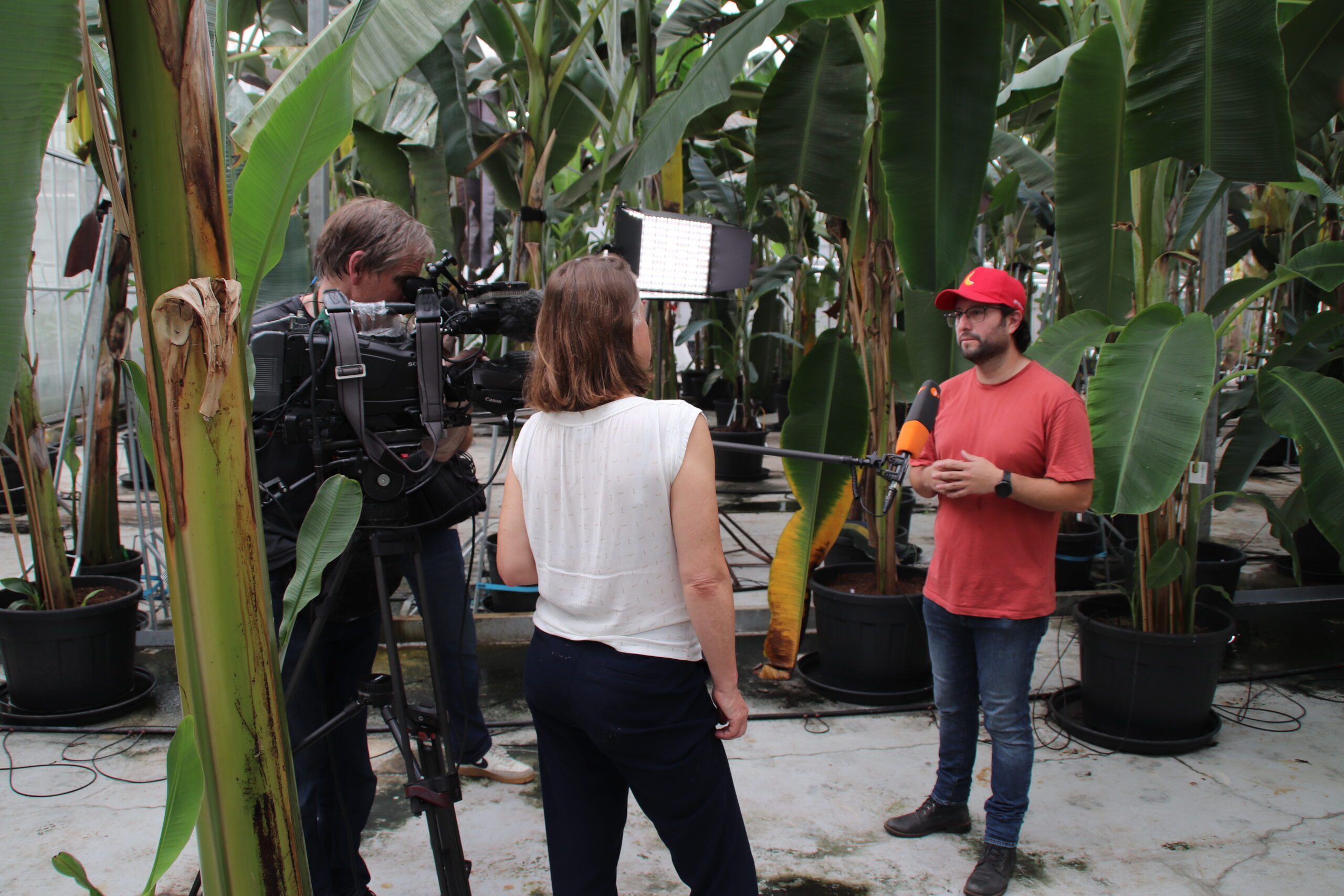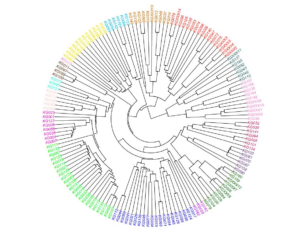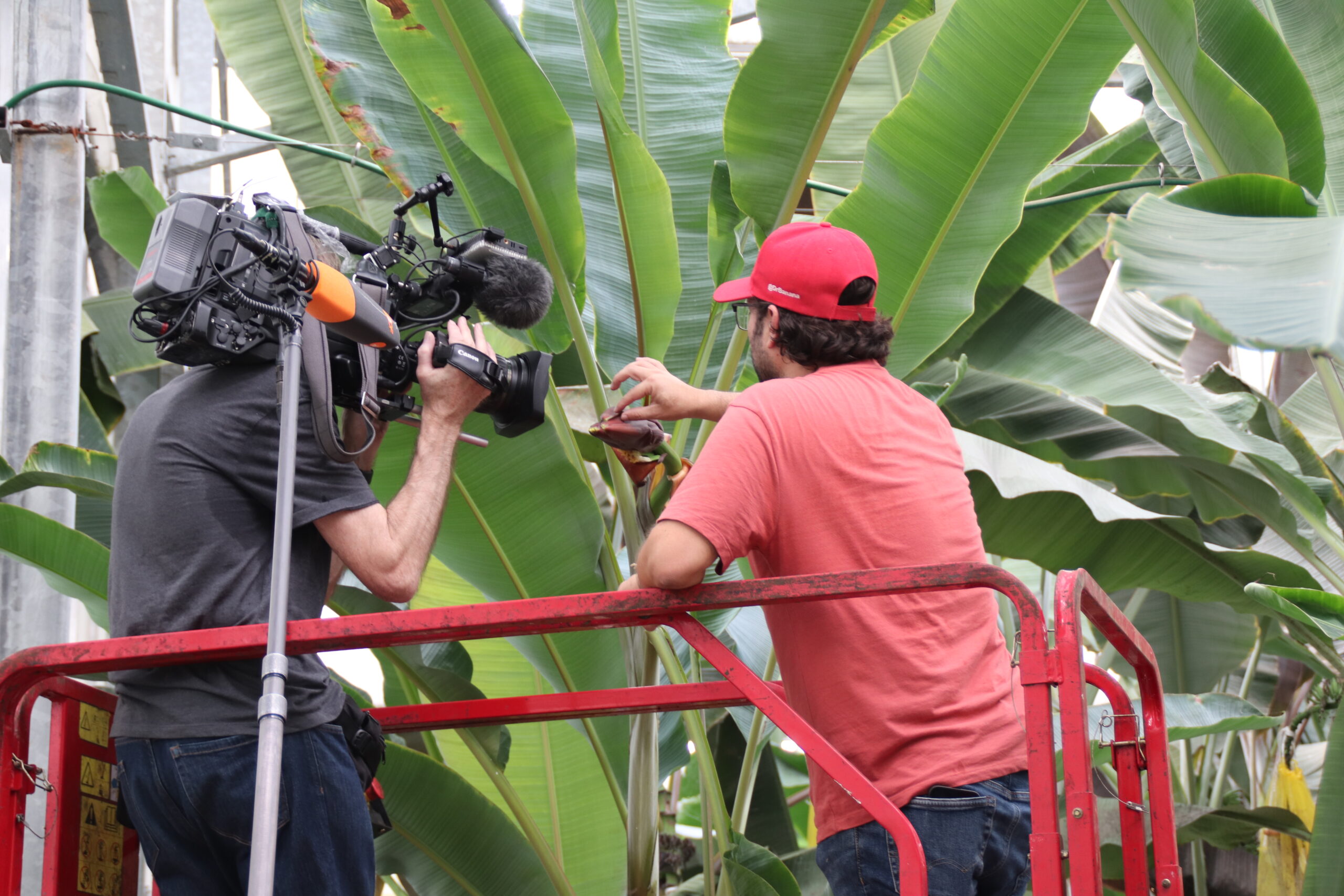26 September 2024
Yelloway presents its first resistant banana plants: Yelloway One

Yelloway, the initiative of Chiquita, KeyGene, MusaRadix, supported by advice from Wageningen University & Research (WUR), introduces Yelloway One, a triploid banana hybrid from the Yelloway breeding program that is resistant to the fungal disease Fusarium Tropical Race 4 (TR4) and partially resistant to Black Sigatoka.
Yelloway’s goal is to develop banana varieties that are resistant to the diseases that threaten the banana with extinction and still have the same look, feel and shelf life as the well-known Cavendish banana.
Yelloway One is the first prototype of the banana varieties that will be developed in the Yelloway breeding program. As the first of a new generation of non-genetically modified, crossbred banana varieties, Yelloway One will help take export banana production into a new era.
Yelloway One
Yelloway One is the first edible banana to present combined resistance to Fusarium Wilt of Banana (FWB), caused by Tropical Race 4 (TR4), and Black Leaf Streak Disease (BLSD) known as Black Sigatoka. TR4 and BLSD pose the biggest threat to the banana industry and cost more than hundreds of millions of dollars annually to control.
Yelloway’s breeding strategy has now proved to be successful: it can yield banana triploid banana plants with resistance to these diseases.
This marks a crucial milestone for Yelloway. It demonstrates that banana varieties resistant to TR4 and Black Sigatoka can be developed through crossbreeding—something the industry has long anticipated. With these new varieties, Yelloway aims to support the global banana industry in tackling these diseases while contributing to more sustainable cultivation practices. Yelloway One is now on the verge of flowering and bearing fruit for the first time in the greenhouse.
The Yelloway team has multiplied the plants and will soon send them to TR4 and Black Sigatoka-affected areas in the Philippines and Indonesia for field trials.
Yelloway: a unique collaboration
Founded in 2020, Yelloway is an innovative partnership between Chiquita, KeyGene, and MusaRadix, in collaboration with Wageningen University & Research.
The initiative envisions a banana sector that has access to plant material resistant to both pathogens and environmental threats.

Dendrogram of 153 banana accessions, based on 10 million SNPs
For Yelloway, KeyGene developed a unique breeding platform to continuously innovate in the development of banana varieties. It combines natural crossbreeding with the latest DNA sequencing and analysis technologies to accelerate the breeding process. With access to a comprehensive collection of banana species and in-depth knowledge of the origins of modern varieties, Yelloway is now creating new test hybrids. These hybrids are selected based on specific desired traits, which are quickly and accurately identified using genetic markers from the Yelloway program.
The Process of breeding Yelloway One
A team of scientists led by Dr. Fernando García-Bastidas from KeyGene in the Netherlands developed Yelloway One.
Three principles make Yelloway’s approach unique. First, genetic diversity, with over 150 banana varieties in Yelloway’s own collection, provides a crucial foundation for the available banana diversity. Second, a deep understanding of plant biology and genetics, pathogens, and the entire cultivation system. Third, the development and application of genetic tools, which sets the program apart.
Yelloway’s approach is entirely data-driven, with technology and data powering every step, enabling the partnership to innovate more quickly and effectively.
The development of Yelloway One took three years. Relying solely on traditional breeding methods would have taken much longer. The collaboration among all parties created a unique environment where innovation thrives, and the development of new varieties proceeds smoothly.

“Every small challenge we overcame represented a significant milestone,” said Fernando García-Bastidas during the presentation of Yelloway One.
“We started by growing bananas in containers in a greenhouse in the Netherlands, using these for crossbreeding to ultimately generate new hybrids. What makes us most proud is the development of our first triploid banana clones resistant to TR4 and BLSD, with Yelloway One being one of them.
We accomplished this in record time, proving that our approach works and that we will deliver innovative varieties in the coming years.”
Photo: Fernando García Bastidas, showing how banana plants are pollinated to a TV crew during the presentation of Yelloway One
Bringing more diversity in the banana crop
Professor Gert Kema from Wageningen University & Research, a key partner of Yelloway, emphasizes that developing new varieties and biodiversity are essential for a sustainable banana sector. He believes that disease resistance will make banana production more sustainable and that new resistant varieties offer opportunities for millions of small farmers in Africa, Asia, and Latin America.
Supporting biodiversity in plant material is crucial to this effort. Yelloway One won’t stand alone; the goal is to create a series of innovative varieties that can be planted together and are genetically distinct from one another.
Yelloway’s work not only adds value to the export sector but also positively impacts food security. Once Yelloway One is completed, the knowledge that makes this possible will be made available for public initiatives. This will enable the development of non-export varieties with improved disease resistance as well.
Read and view more
- This news is also available in French and Dutch
- Banana breeding and research at KeyGene
- The Yelloway page on Linked In
- The Yelloway page of Chiquita
- The webpage of Wageningen University & Research about their Translational Phytopathology research
- Building Back Biodiversity: Expanding the Banana Family, blogpost on keygene.com, June 2023
- Business Insider documentary ‘Why The World’s Most Popular Banana May Go Extinct’ on YouTube, 2021
- WUR and KeyGene to contribute to African banana varieties resistant to Panama disease, news item on keygene.com, September 2020
- First Report of Panama disease in Cavendish bananas caused by Tropical Race 4 in Colombia, news item on keygene.com, October 2019
- KeyGene’s ‘Panama disease’ expert coordinates diagnostics on suspected Colombian banana farms, news item on keygene.com, July 2019